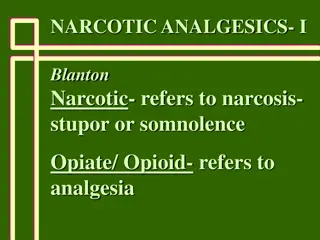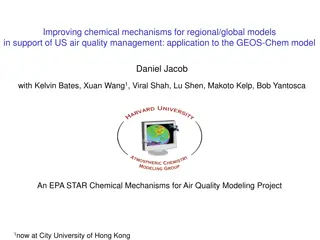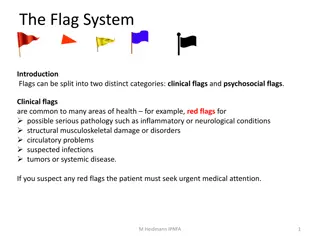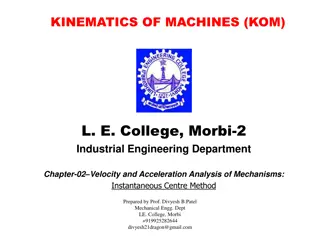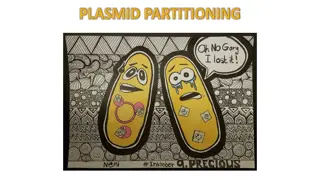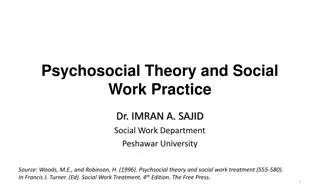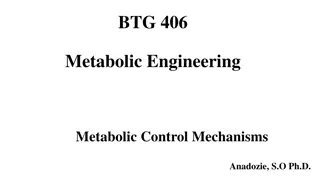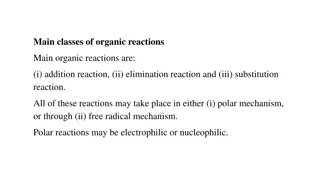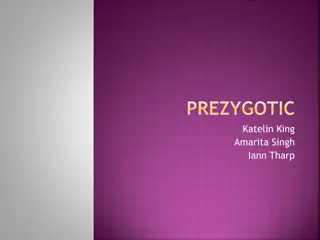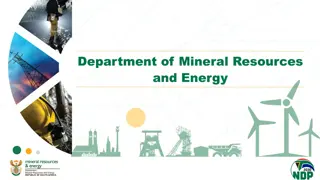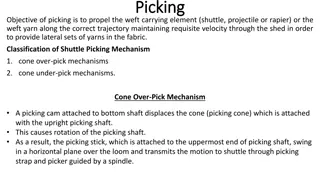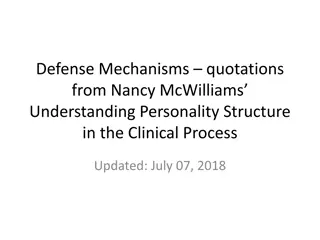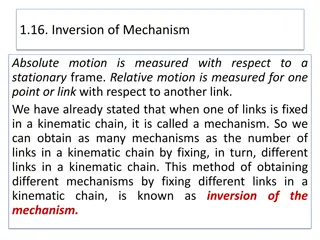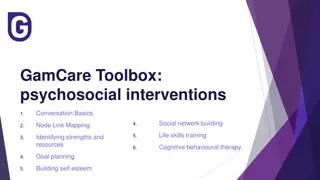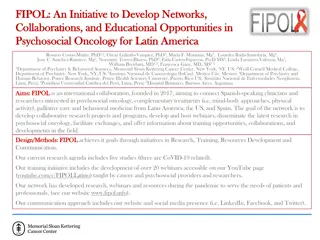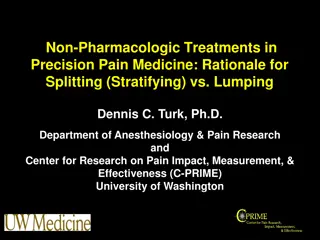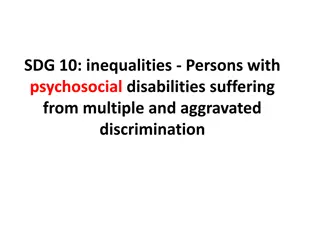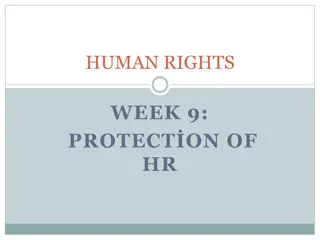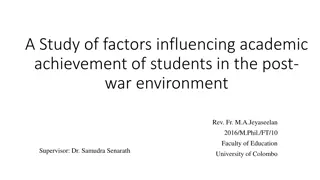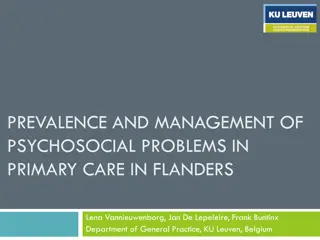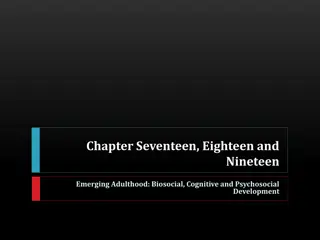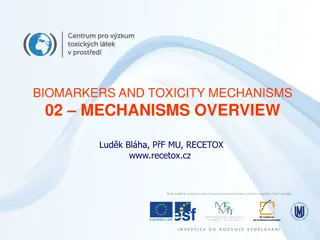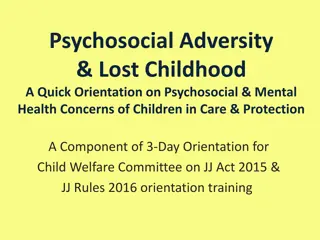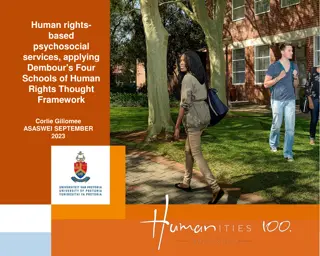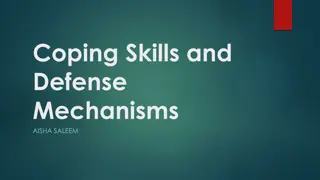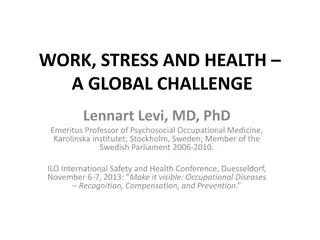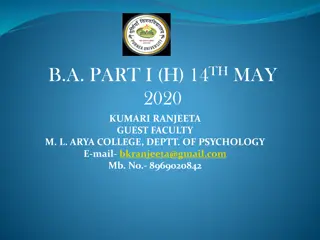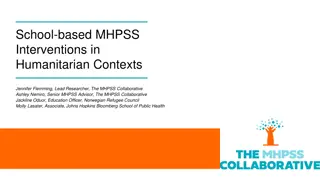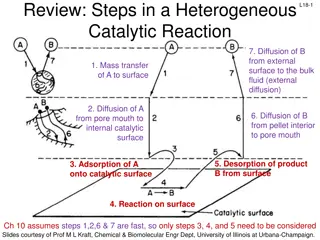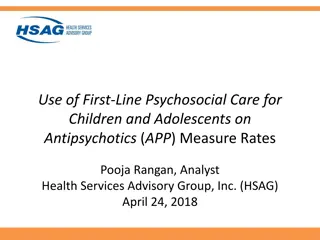Interpersonal factors and their impact on pain transitions
Exploring the impact of interpersonal factors on pain transitions, this research delves into the communication and behaviors between individuals experiencing pain, such as parent-child relationships and interactions with healthcare providers. The study analyzes psychosocial mechanisms influencing pa
3 views • 24 slides
Support and Unity Initiatives by ASSOCIATION FOR THE SUPPORT AND ENCOURAGEMENT OF UNITY CROATIA
Founded in 2014, this association based in Croatia focuses on promoting equality, peacekeeping, demining activities, and social solidarity. Their main activities involve educating civilians on mine dangers, psychosocial empowerment of children, and international experiences with victims of war and v
1 views • 10 slides
Understanding Narcotic Analgesics and Opiates: History, Mechanisms, and Uses
Delve into the world of narcotic analgesics and opiates, exploring the history of opium poppy, morphine derivatives, opioid compounds, and the pharmacology mechanisms of action. Discover the uses of opiates in analgesia, preanesthetic medication, and more, alongside the endogenous ligands involved.
8 views • 55 slides
Advancements in Chemical Mechanisms for Air Quality Management
Daniel Jacob and team have been enhancing chemical mechanisms in the GEOS-Chem model to support US air quality management. Ongoing work includes developing new mechanisms for aromatic VOCs, tropospheric halogens, mercury redox, adaptive mechanism reduction, machine learning applications, and unifica
0 views • 19 slides
The Flag System: Identifying Clinical and Psychosocial Flags in Health Settings
The Flag System categorizes flags into clinical and psychosocial categories, such as red flags for serious pathology and orange flags for mental health issues. Psychosocial flags like yellow, blue, and black identify factors affecting recovery and return-to-work processes. Screening tools like PHQ-2
4 views • 7 slides
Kinematics of Machines: Instantaneous Center Method for Velocity and Acceleration Analysis
Explore the method of locating instantaneous centers in mechanisms to analyze velocity and acceleration. The content covers examples of pin-jointed four-bar mechanisms and slider-crank mechanisms, providing dimensions and angular velocities calculations. Prof. Divyesh B. Patel from L.E. College, Mor
0 views • 13 slides
Understanding Plasmid Partitioning Mechanisms in Bacteria
The stable maintenance of low-copy-number plasmids in bacteria relies on partition mechanisms that ensure proper positioning during cell division. Different from high-copy-number plasmids, which rely on random diffusion, low-copy-number plasmids require regulated partitioning mechanisms to prevent d
0 views • 14 slides
Understanding Psychosocial Theory in Social Work Practice
Social work practice has always integrated psychosocial concepts to address human well-being and social functioning. Psychosocial caseworkers aim to help clients navigate challenges stemming from environmental imbalances. The term "psychosocial" refers to the interaction of psychological and societa
0 views • 27 slides
Understanding Metabolic Control Mechanisms in Cellular Regulation
Metabolic control mechanisms play a crucial role in maintaining homeostasis within cells by regulating metabolic pathways. This involves finely adjusting the output of pathways in response to external signals, ensuring the proper flux of metabolites to meet cellular needs. Pacemaker enzymes, such as
1 views • 17 slides
Overview of Organic Reactions and Mechanisms
Organic reactions can be categorized into addition, elimination, and substitution reactions, occurring through either polar or free radical mechanisms. Polar reactions may be electrophilic or nucleophilic, while free radical reactions involve radicals reacting to complete electron octets. Different
2 views • 26 slides
Understanding Prezygotic Reproductive Isolating Mechanisms
Prezygotic reproductive isolating mechanisms prevent mating or fertilization between different species before it can occur. Examples include habitat isolation, behavioral isolation, and temporal isolation. These mechanisms play a significant role in maintaining species integrity and preventing the f
0 views • 4 slides
Understanding Physical Changes in Old Age and Relevant Theories
Late adulthood, typically starting around age 65, is a period where individuals confront the psychosocial task of integrity versus despair. Geropsychology plays a vital role in studying aging and providing clinical support. Erikson's ninth stage of psychosocial development suggests that older adults
1 views • 14 slides
Fuel Pricing Mechanisms and Regulatory Framework Presentation
This presentation to the Portfolio Committee on Mineral Resources and Energy delves into the Basic Fuel Price (BFP) for liquid fuels, covering global fuel pricing forms, policy positions, key pricing mechanisms, regulatory mandates, and the intricate structure behind fuel prices. It explains how the
2 views • 28 slides
Facilitating Access to GBV Services in Tigray: Service Mapping and Findings
This project in Tigray aims to enhance access to Gender-Based Violence (GBV) response services by mapping existing services, identifying gaps, and recommending improvements. With a focus on health, psychosocial, legal, and safety services, the initiative targets specific zones within the region. The
0 views • 10 slides
Psychosocial Treatments for Substance Use Disorders: Strategies and Interventions
Delve into the world of psychosocial treatments for substance use disorders with Dr. Amalia Bullard at Kansas City VA Medical Center. Explore empirical-supported interventions, motivational interviewing, cognitive behavioral therapies, and more to understand the mechanisms of change and the importan
1 views • 91 slides
Understanding Shuttle Picking Mechanisms in Weaving
Shuttle picking mechanisms play a crucial role in propelling the weft carrying element to maintain the required trajectory and velocity in fabric weaving. Two common mechanisms are cone over-pick and cone under-pick, each offering unique adjustments for strength and timing. The cone over-pick involv
0 views • 14 slides
Exploring Defense Mechanisms in Personality Structure
In "Understanding Personality Structure in the Clinical Process" by Nancy McWilliams, various defense mechanisms are illustrated through real-life examples. These mechanisms include primitive withdrawal, denial, omnipotent control, idealization and devaluation, and projection with projective identif
1 views • 29 slides
Understanding Host Defense Mechanisms Against Infection
Host defense mechanisms safeguard the body from pathogens through various strategies such as intact skin, mucous membranes, nonspecific immune responses like phagocytic cells, and specific immune responses involving antibodies and lymphocytes. Key protective barriers include the skin, eyes, digestiv
3 views • 16 slides
Psychosocial Care Training Workshop for Children in Difficult Circumstances
This training workshop focused on understanding children's psychosocial issues, linking child protection with psychosocial care, and developing essential skills for providing supportive care to children in challenging situations. Participants engaged in various interactive learning methods, includin
0 views • 85 slides
Understanding the Inversion of Mechanisms in Kinematics
Inversion of Mechanisms in Kinematics involves measuring absolute and relative motions in stationary and moving frames, respectively. By fixing different links in a kinematic chain, we can obtain various mechanisms. This process does not alter relative motions but may significantly change absolute m
0 views • 78 slides
Psychosocial Interventions in Problem Gambling: A Holistic Approach
Explore the comprehensive framework of psychosocial interventions for problem gambling, including motivational interviewing, cognitive-behavioral therapy, self-esteem building, life skills training, social network building, goal planning, and more. Learn about the core competencies needed for a reco
0 views • 46 slides
Safeguarding Focal Point Training: Enhancing Reporting and Response Mechanisms
This training module focuses on empowering Safeguarding Focal Points (SFPs) to understand and implement community-based feedback and response mechanisms, effectively handle safeguarding complaints, document barriers to reporting, address data protection issues, and ensure inclusive and confidential
0 views • 18 slides
FIPOL Initiative: Developing Networks & Educational Opportunities in Psychosocial Oncology for Latin America
FIPOL, an international collaboration founded in 2017, aims to connect clinicians and researchers interested in psychosocial oncology in Latin America, the US, and Spain. Through research projects, webinars, and resources, FIPOL strives to advance the field and support patients and professionals, es
0 views • 4 slides
Understanding Authentication Mechanisms and Security Vulnerabilities
Authentication lies at the core of application security, serving as the primary defense against malicious attacks. This article explores various authentication technologies, including HTML forms-based authentication, multi-factor mechanisms, client SSL certificates, and more. It delves into common d
0 views • 70 slides
Non-Pharmacologic Treatments in Precision Pain Medicine: Splitting vs. Lumping Criteria
This article discusses the rationale behind splitting (stratifying) versus lumping patients in precision pain medicine. It explores criteria for stratifying patients based on demographic, genetics, biomedical mechanisms, clinical presentation, etiological factors, and psychological response to treat
0 views • 35 slides
Addressing Inequalities Faced by Persons with Psychosocial Disabilities
Persons with psychosocial/mental disabilities globally experience discrimination, impacting their rights and opportunities. Violations include coercion, denial of legal capacity, limited access to education and employment, and more. International human rights standards, such as the CRPD, emphasize n
0 views • 7 slides
Overview of Human Rights Monitoring Mechanisms
Human rights conventions under the United Nations and regional systems have established monitoring mechanisms to ensure compliance. These mechanisms include treaty-based and non-treaty-based approaches, with treaty bodies overseeing the implementation of legally binding instruments. Reporting proced
0 views • 23 slides
Improved Truthful Mechanisms for Subadditive Combinatorial Auctions
This research paper discusses strategies to maximize welfare in combinatorial auctions. It explores mechanisms for handling strategic bidders with private valuations, aiming to design truthful and optimal welfare mechanisms while considering polytime constraints. The study presents advancements in a
0 views • 19 slides
Factors Influencing Academic Achievement of Students in Post-War Environment
This study explores the impact of personal and environmental factors on academic achievement in the post-war context, addressing challenges such as psychosocial issues, low academic performance, and socio-economic factors affecting students' learning. Various research studies are reviewed to underst
0 views • 11 slides
Prevalence and Management of Psychosocial Problems in Primary Care in Flanders
This research project aims to assess the prevalence, presentation, and handling of psychosocial problems in primary care in Flanders. The methodology includes a mixed method approach using fishbone diagrams and interviews with health care professionals. Key findings include the conceptualization and
0 views • 18 slides
Insights on Emerging Adulthood and Psychosocial Development
Delve into the unique stage of emerging adulthood, spanning ages 18-25, characterized by factors like delayed marriage, higher education pursuits, and vocational instability. Explore themes of homeostasis, risk-taking behavior, psychopathology risks, and Erik Erikson's stage of Intimacy vs. Isolatio
0 views • 43 slides
Understanding Biomarkers and Toxicity Mechanisms: Overview of Mechanisms in Targeting Biological Macromolecules
This overview delves into different categorizations of mechanisms of action (MoA) based on target molecules, interaction types, and steric specificity. It explores non-specific and specific mechanisms, along with possible categorizations involving membrane toxicity, reactive toxicity, and species-sp
0 views • 8 slides
Understanding Psychosocial Adversity in Children: A Comprehensive Overview
Exploring the deep-rooted issues of psychosocial adversity and lost childhood in children under care and protection, this orientation sheds light on the various challenges and dynamics involved. It delves into the profiling of children in difficult circumstances and highlights the different contexts
0 views • 26 slides
Human Rights-Based Psychosocial Services and Dembour's Framework
Human rights-based social work practice involves upholding principles such as human dignity, nondiscrimination, participation, transparency, and accountability. It is rooted in advocacy, activism, and the application of Dembour's Four Schools of Human Rights Thought to offer psychosocial support aft
0 views • 21 slides
Understanding Coping Skills and Defense Mechanisms
Coping mechanisms and defense mechanisms are strategies individuals use to manage stress and emotions. Coping mechanisms help people adjust to difficult events while maintaining emotional well-being, whereas defense mechanisms operate at an unconscious level and can change internal psychological sta
0 views • 18 slides
Global Challenges in Work, Stress, and Health
The global challenges related to work, stress, and health are being addressed through various initiatives and reports. Lennart Levi, an expert in psychosocial occupational medicine, highlights the importance of recognizing, compensating, and preventing occupational diseases. The International Labour
0 views • 71 slides
Defense Mechanisms in Psychology: Understanding Repression, Displacement, Intellectualization, Rationalization
Defense mechanisms play a crucial role in how individuals cope with stress and anxiety. This text delves into key defense mechanisms such as repression, displacement, intellectualization, and rationalization. These mechanisms help individuals manage unacceptable thoughts, feelings, and impulses by r
0 views • 11 slides
School-Based MHPSS Interventions in Humanitarian Contexts Realist Review
Conducted by a team of researchers and advisors, the realist review focuses on understanding the characteristics, mechanisms, and outcomes of school-based Mental Health and Psychosocial Support (MHPSS) interventions in humanitarian settings. The study aims to uncover how these interventions impact t
0 views • 21 slides
Understanding Steps in Heterogeneous Catalytic Reactions and Adsorption Mechanisms
This review discusses the steps involved in a heterogeneous catalytic reaction, focusing on diffusion, mass transfer, adsorption, and desorption processes. It details the site balance, surface reaction mechanisms, and desorption steps, providing insights into the complexities of catalytic processes.
0 views • 17 slides
First-Line Psychosocial Care for Children and Adolescents on Antipsychotics: Performance Measure Results
The performance measure assessed the use of first-line psychosocial care for children and adolescents on antipsychotics in Virginia, showing a total measure result of 68.98%. The measure aims to promote safer interventions before prescribing antipsychotic medications to minimize risks. Results were
0 views • 25 slides


